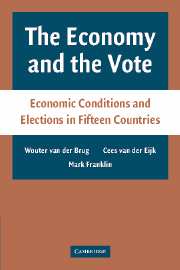Book contents
- Frontmatter
- Contents
- Preface
- Introduction
- 1 Studying Economic Voting
- 2 Party Choice as a Two-Stage Process
- 3 Hypotheses and Data: The Theoretical and Empirical Setting
- 4 Effects of the Economy on Party Support
- 5 The Economic Voter
- 6 From Individual Preferences to Election Outcomes
- 7 The Economy, Party Competition, and the Vote
- Epilogue: Where to Go from Here in the Study of Economic Voting?
- Appendix A The Surveys Employed in This Book
- Appendix B Detailed Results Not Reported in the Main Text
- References
- Index
5 - The Economic Voter
Published online by Cambridge University Press: 18 December 2009
- Frontmatter
- Contents
- Preface
- Introduction
- 1 Studying Economic Voting
- 2 Party Choice as a Two-Stage Process
- 3 Hypotheses and Data: The Theoretical and Empirical Setting
- 4 Effects of the Economy on Party Support
- 5 The Economic Voter
- 6 From Individual Preferences to Election Outcomes
- 7 The Economy, Party Competition, and the Vote
- Epilogue: Where to Go from Here in the Study of Economic Voting?
- Appendix A The Surveys Employed in This Book
- Appendix B Detailed Results Not Reported in the Main Text
- References
- Index
Summary
The models of economic voting presented in Chapter 4 hardly paint a picture of Homo economicus. Effects of the economy are small compared to other effects on party support. Of course, small effects can have large consequences if they lead to a substantial segment of the electorate changing its party choice from one party to another. So, in order to assess the political consequences of changing economic conditions, we should know which groups of voters are affected by such changes. Much of the existing research has treated voters as homogeneous in the way they reach their decisions. However, some recent studies have suggested that voters are rather heterogeneous in the way they reach electoral decisions (Sniderman, Brody, and Tetlock 1991; Bartle 1997; Krause 1997; Pattie and Johnston 2001; Dorussen and Taylor 2002; Kroh 2003; Zaller 2005). One purpose of this chapter is to assess whether specific groups of voters are more responsive to changing economic conditions than others. We need this information in order to assess properly the consequences of changing economic conditions on election outcomes, which we turn to in the next chapter. Another purpose is to explore in more detail the effects of economic voting at the individual level and to evaluate those effects in the context of other effects on voters' party preferences. We will start by rehearsing the individual-level implications of our findings so far.
- Type
- Chapter
- Information
- The Economy and the VoteEconomic Conditions and Elections in Fifteen Countries, pp. 117 - 136Publisher: Cambridge University PressPrint publication year: 2007

